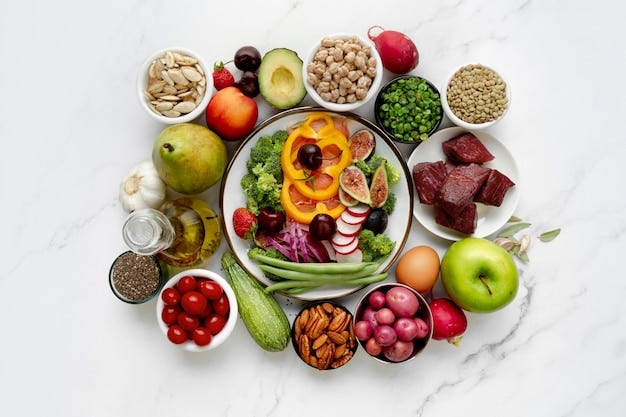The gut is a vibrant ecosystem, teeming with a diverse array of microbes. Maintaining the delicate balance of these microbes is crucial for digestive wellness, which in turn impacts various aspects of our overall health.
As a seasoned registered dietitian (RD), I have discovered that certain superfoods can play a pivotal role in promoting digestive balance. These superfoods are not only natural but also packed with essential nutrients that can promote regularity, balance, and overall wellness. In this guide, we will delve into the top ten superfoods for digestive support, providing you with a comprehensive list of foods that can nourish your gut and promote digestive health.
What Are Superfoods?
Superfoods are nutrient-rich foods that are considered to be especially beneficial for health and well-being. These foods are typically rich in vitamins, minerals, antioxidants, and other nutrients that are important for overall health. Superfoods are often touted for their potential to reduce the risk of chronic diseases, improve digestion, boost energy levels, and support overall health.
Some examples of superfoods include berries, leafy greens, nuts and seeds, fatty fish, and whole grains. These foods are not only nutritious but also delicious and can easily be incorporated into a balanced diet.
What Is a Healthy Gut?
A healthy gut refers to a digestive system that is functioning optimally and is in a state of balance. The gut is home to trillions of microorganisms, including bacteria, viruses, and fungi, collectively known as the gut microbiota. These microorganisms play a crucial role in digestion, nutrient absorption, and immune function.
A healthy gut is characterized by a diverse and balanced gut microbiota. When the balance of these microorganisms is disrupted, it can lead to digestive issues, such as bloating, gas, diarrhea, or constipation. Imbalances in the gut microbiota have also been linked to other health issues, including obesity, diabetes, and autoimmune diseases.
Maintaining a healthy gut involves eating a balanced diet rich in fiber and nutrients, staying hydrated, getting regular exercise, managing stress, and avoiding excessive use of antibiotics. Probiotic-rich foods, such as yogurt, kefir, and sauerkraut, can also help support a healthy gut by providing beneficial bacteria.
10 Best Superfoods to Aid Gut Health
The gut is a dynamic ecosystem with an intricate network of microbes. Maintaining the right balance of these microbes is key to digestive wellness, which, in turn, has been suggested to influence various facets of our health. Superfoods can play a crucial role in promoting digestive balance, serving as natural and nutrient-dense additions to our diets. Here, we outline the top ten superfoods for digestive support, all packed with essential nutrients that may promote regularity, balance, and overall wellness.
1. Prebiotics, Probiotics, and Synbiotics
Prebiotics: Prebiotics are natural soluble fibers that the good bacteria feed on in the large intestine, helping to ensure healthy bowel function and balanced gut flora. Sources include fresh vegetables like leafy greens and fruits like pineapple, kiwi, and oranges, as well as dandelions, asparagus, oats, and legumes.
Probiotics: Probiotics are beneficial bacteria that can help our bodies support healthy metabolism and immune system function. They can be found in fermented foods like yogurt, kefir, miso, kimchi, sauerkraut, kombucha, and tempeh.
Synbiotics: Some foods contain both prebiotics and probiotics to give the beneficial microorganisms the best chance of survival in your gut. Meal combos like yogurt with oats and fruits or miso soup garnished with legumes or asparagus are excellent examples of synbiotic-rich foods.
2. Ginger
Ginger is renowned for its ability to support a healthy digestive system. It contains compounds that can ease discomfort and promote a healthy balance of gut bacteria. Gingerol, an active compound in ginger, has been linked to better gastrointestinal motility, which means it can help food move through the digestive system more efficiently.
3. Leafy Greens
Leafy greens like kale and spinach are rich in nutrients like potassium, calcium, iron, and vitamins K, C, and B complex. They are also potent prebiotics, encouraging the growth of healthy gut bacteria. Regular consumption of leafy greens can help repopulate the good gut microbiome and reduce inflammation in the digestive tract.
4. Chia Seeds
Chia seeds are packed with fiber and omega-3 fatty acids. They can help balance out harmful gut bacteria and support weight management. Chia seeds can also enhance the structure and strength of intestinal muscles, optimizing their performance.
5. Oats
Oats are a great source of prebiotic fiber called beta-glucan. They can help scrub the intestine lining for better nutrient absorption and promote satiety, reducing the frequency of eating. Oats can be consumed after an overnight soak or as oat bran, which is also rich in beta-glucan.
6. Asparagus
Asparagus is rich in inulin, a prebiotic fiber that serves as food for beneficial gut microbes. Regular consumption of asparagus can help maintain digestive balance and support overall gut health.
7. Flaxseeds
Flaxseeds are rich in both soluble and insoluble fiber. They can help encourage mucus production in the gut, maintaining the integrity of the gut barrier and reducing inflammation. It’s best to soak or grind flaxseeds before eating to maximize their benefits.
8. Jerusalem Artichokes
Jerusalem artichokes are rich in prebiotic fibers like galacto-oligosaccharides (GOS) and fructo-oligosaccharides (FOS). They can help nourish healthy probiotics like Lactobacillus and Bifidobacteria. However, excessive consumption of Jerusalem artichokes can lead to gas production in the gut.
9. Turmeric
Turmeric contains curcumin, which can help balance gut microbiota and support digestive health. Curcumin also has anti-inflammatory properties, making it a natural way to support a healthy digestive system.
10. Peppermint
Peppermint acts as an antispasmodic, supporting regularity and aiding digestion. It can also help alleviate nausea, making it a refreshing and effective option for digestive health.
Incorporating these superfoods into your diet can make a significant difference in maintaining optimal digestive health. They are not only nutritious but also natural ways to support your digestive system
References
- https://www.webmd.com/digestive-disorders/ss/slideshow-best-worst-foods-for-gut-health
- https://www.ncbi.nlm.nih.gov/pmc/articles/PMC4648921/
- https://www.ncbi.nlm.nih.gov/pmc/articles/PMC6463098/
- https://my.clevelandclinic.org/health/articles/14598-probiotics
- https://www.ncbi.nlm.nih.gov/pmc/articles/PMC6341159/
- https://www.ncbi.nlm.nih.gov/pmc/articles/PMC3665023/
- https://www.ncbi.nlm.nih.gov/pmc/articles/PMC6316011/
- https://health.clevelandclinic.org/benefits-of-chia-seeds/
- https://www.hsph.harvard.edu/nutritionsource/what-should-you-eat/whole-grains/
- https://pubmed.ncbi.nlm.nih.gov/32829873/
- https://journals.physiology.org/doi/full/10.1152/ajpgi.00101.2018#:~:text=Flaxseed%20supplementation%20has%20been%20reported%20to%20increase%20markers%20of%20a%20healthy%20gut%20barrier%2C%20including%20goblet%20cell%20density
- https://www.ncbi.nlm.nih.gov/pmc/articles/PMC7356569/
- https://www.ncbi.nlm.nih.gov/pmc/articles/PMC8572027/
- https://www.ncbi.nlm.nih.gov/pmc/articles/PMC5814329/







